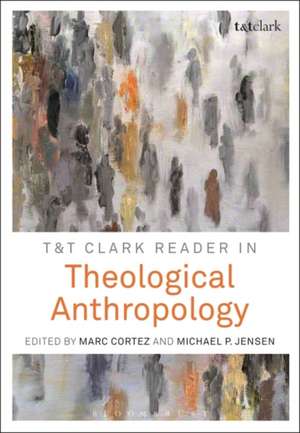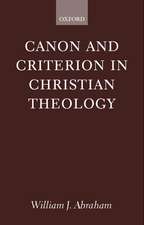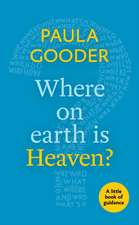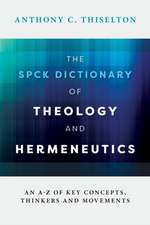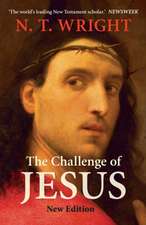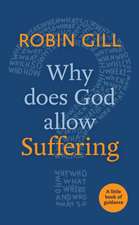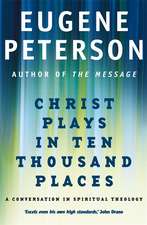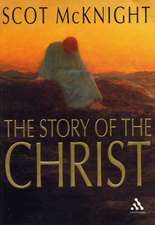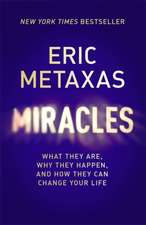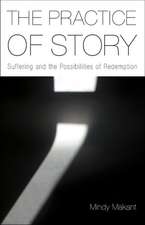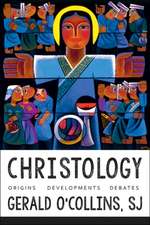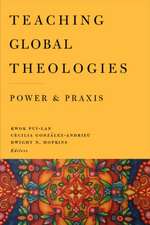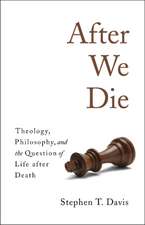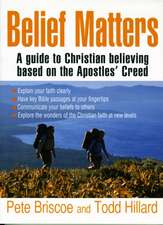T&T Clark Reader in Theological Anthropology
Editat de Rev'd Dr Michael P. Jensen, Dr Marc Cortezen Limba Engleză Paperback – 27 dec 2017
| Toate formatele și edițiile | Preț | Express |
|---|---|---|
| Paperback (1) | 278.03 lei 6-8 săpt. | |
| Bloomsbury Publishing – 27 dec 2017 | 278.03 lei 6-8 săpt. | |
| Hardback (1) | 897.24 lei 6-8 săpt. | |
| Bloomsbury Publishing – 27 dec 2017 | 897.24 lei 6-8 săpt. |
Preț: 278.03 lei
Preț vechi: 333.13 lei
-17% Nou
Puncte Express: 417
Preț estimativ în valută:
53.21€ • 54.97$ • 44.28£
53.21€ • 54.97$ • 44.28£
Carte tipărită la comandă
Livrare economică 26 martie-09 aprilie
Preluare comenzi: 021 569.72.76
Specificații
ISBN-13: 9780567655578
ISBN-10: 0567655571
Pagini: 512
Dimensiuni: 169 x 244 x 34 mm
Greutate: 0.73 kg
Editura: Bloomsbury Publishing
Colecția T&T Clark
Locul publicării:London, United Kingdom
ISBN-10: 0567655571
Pagini: 512
Dimensiuni: 169 x 244 x 34 mm
Greutate: 0.73 kg
Editura: Bloomsbury Publishing
Colecția T&T Clark
Locul publicării:London, United Kingdom
Caracteristici
The
questions
and
introductory
material
guide
students
in
further
investigation
of
the
issues
Notă biografică
Marc
Cortezis
Professor
of
Theology
at
Wheaton
College,
Wheaton,
USA.Michael
P.
Jensenis
the
Rector
of
St
Mark's
Anglican
Church,
Darling
Point,
Sydney,
and
teaches
theology
at
the
Sydney
College
of
Divinity
Cuprins
Introduction1
Sources
and
MethodsText
1:
Claus
Westermann,
The
Human
in
the
Old
TestamentText
2:
Werner
Georg
K
ü
mmel,
Man
in
the
New
TestamentText
3:
J.
Patout
Burns,
Theological
AnthropologyText
4:
Karl
Barth,
Church
Dogmatics
Text
5:
Kathryn
Tanner,
"On
the
Difference
Theological
Anthropology
Makes"Text
6:
Ada
Mar
í
a
Isasi-D
í
az,
"Elements
of
a
Mujerista
Anthropology"2
The
Image
of
GodText
1:
Augustine
of
Hippo,
The
Literal
Meaning
of
Genesis
Text
2:
Thomas
Aquinas
Summa
Theologiae
Text
3
John
Calvin,
"Commentary
Upon
Gen.
1:26-28"Text
4:
Karl
Barth,
Church
Dogmatics
Text
5:
Mary
McClintock
Fulkerson
"The
Imago
Dei
and
a
Reformed
Logic
for
a
Feminist/Womanist
Critique"Text
6:
Colin
Gunton
"The
Human
Creation:
Towards
a
Renewal
of
the
Doctrine
of
the
Imago
Dei"Text
7:
Michael
S.
Horton,
"Image
and
Office
Human
Personhood
and
the
Covenant"3
Human
OntologyText
1:
Tertullian,
A
Treatise
on
the
Soul
Text
2:
Gregory
of
Nyssa,
On
the
Making
of
Humanity
Text
3:
Thomas
Aquinas,
Summa
Theologica
Text
4:
Hans
Walter
Wolff,
"Nephesh"
in
Anthropology
of
the
Old
Testament
Text
5:
Wolfhart
Pannenberg,
Systematic
Theology
Text
6:
Nancey
C.
Murphy,
"Nonreductive
Physicalism:
Philosophical
Issues"Text
7:
Alvin
Plantinga,
Against
Materialism4
Free
WillText
1:
Gregory
of
Nyssa
"Sixth
Sermon
on
the
Beatitudes"Text
2:
Augustine,
On
Grace
and
Free
Will?
Text
3:
Anselm:
On
Free
Will
Text
4:
Desiderius
Erasmus,
On
the
Freedom
of
the
Will,
&
Martin
Luther
"On
the
Bondage
of
the
Will"Text
5:
William
GT
Shedd,
Dogmatic
Theology
Text
6:
Peter
G.H.
Clarke,
"Determinism,
Brain
Function
and
Free
Will"5
Gender
and
SexualityText
1:
Gregory
of
Nyssa,
On
Virginity
Text
2:
Augustine,
Of
the
Good
of
Marriage
Text
3:
Thomas
Aquinas,
Summa
Theologiae
Text
4:
Martin
Luther,
The
Estate
of
Marriage
Text
5:
John
Paul
II,
Man
and
Woman
He
Created
Them:
A
Theology
of
the
Body
Text
6:
Rosemary
Radford
Ruether,
"Can
a
Male
Saviour
Save
Women?"Text
7:
Sarah
Coakley,
"The
Eschatological
Body:
Gender,
Transformation,
and
God"6
Human
PersonhoodText
1:
John
Zizioulas,
"Human
Capacity
and
Human
Incapacity:
A
Theological
Exploration
of
Personhood"Text
2:
Harriet
A.
Harris,
"Should
we
say
that
personhood
is
relational?"Text
3:
Robert
Spaemann,
Persons:
The
Difference
between
"Someone"
and
"Something"
Text
4:
Robert
Jenson,
Systematic
Theology
Text
5:
David
H.
Kelsey,
Eccentric
Existence:
A
Theological
Anthropology7
Worship
and
DesireText
1
Bernard
of
Clairvaux
On
Loving
God
Text
2:
John
Calvin,
Institutes
of
the
Christian
Religion
Text
3
William
James
The
Varieties
of
Religious
Experience
Text
4:
Fergus
Kerr,
Immortal
Longings
Text
5:
Uffe
Schjoedt,
"The
Religious
Brain:
A
General
Introduction
to
the
Experimental
Neuroscience
of
Religion"Author
Index
Subject
Index
Recenzii
What
does
it
mean
to
be
fully
human,
living
before
God
and
neighbor
even
as
we
are
connected
to
the
rest
of
creation?
Questions
and
possibilities
raised
in
theological
anthropology
are
always
stimulating
and
unendingly
relevant.
Thankfully,
in
this
new
volume
readers
are
invited
into
this
rich
conversation,
hearing
different
voices
representing
ancient
wisdom
and
contemporary
concerns.
All
the
key
aspects
of
theological
anthropology
are
touched
upon
here,
providing
the
context
for
meaningful
reflection
and
discussion
that
is
sure
to
follow.
I
have
been
waiting
for
an
updated
primary
source
volume
on
anthropology
that
covered
more
than
Patristic
and
medieval
sources
while
still
valuing
those
honored
voices
-
I
now
finally
have
that
volume
in
my
hands!
Students
and
Professors
will
be
very
thankful
to
Marc
Cortez
and
Michael
Jensen
for
this
well-organized
and
ably
presented
gift.
This anthology is both creative and comprehensive, providing resources on classic themes in theological anthropology while also reimagining the field in fresh ways. The voices are both ancient and contemporary, offering an overview of a long conversation about the nature of the human. An excellent classroom resource.
The Psalmist asked, 'What are human beings that you are mindful of them?' This reader provides an excellent collection of judiciously chosen and introduced responses to this and related questions from a variety of patristic, medieval, Reformation, modern, and contemporary theologians. The editors have done well to sub-divided the Psalmist's question into seven areas, including imago Dei, freedom, sexuality, and personhood as well as a welcome concluding section on worship and desire. The editors have included both the usual suspects (e.g., Augustine, Calvin, Barth) and contemporary voices that engage what the sciences are saying about humanity, making this reader a fine choice for both survey courses and advanced seminars.
This anthology is both creative and comprehensive, providing resources on classic themes in theological anthropology while also reimagining the field in fresh ways. The voices are both ancient and contemporary, offering an overview of a long conversation about the nature of the human. An excellent classroom resource.
The Psalmist asked, 'What are human beings that you are mindful of them?' This reader provides an excellent collection of judiciously chosen and introduced responses to this and related questions from a variety of patristic, medieval, Reformation, modern, and contemporary theologians. The editors have done well to sub-divided the Psalmist's question into seven areas, including imago Dei, freedom, sexuality, and personhood as well as a welcome concluding section on worship and desire. The editors have included both the usual suspects (e.g., Augustine, Calvin, Barth) and contemporary voices that engage what the sciences are saying about humanity, making this reader a fine choice for both survey courses and advanced seminars.
